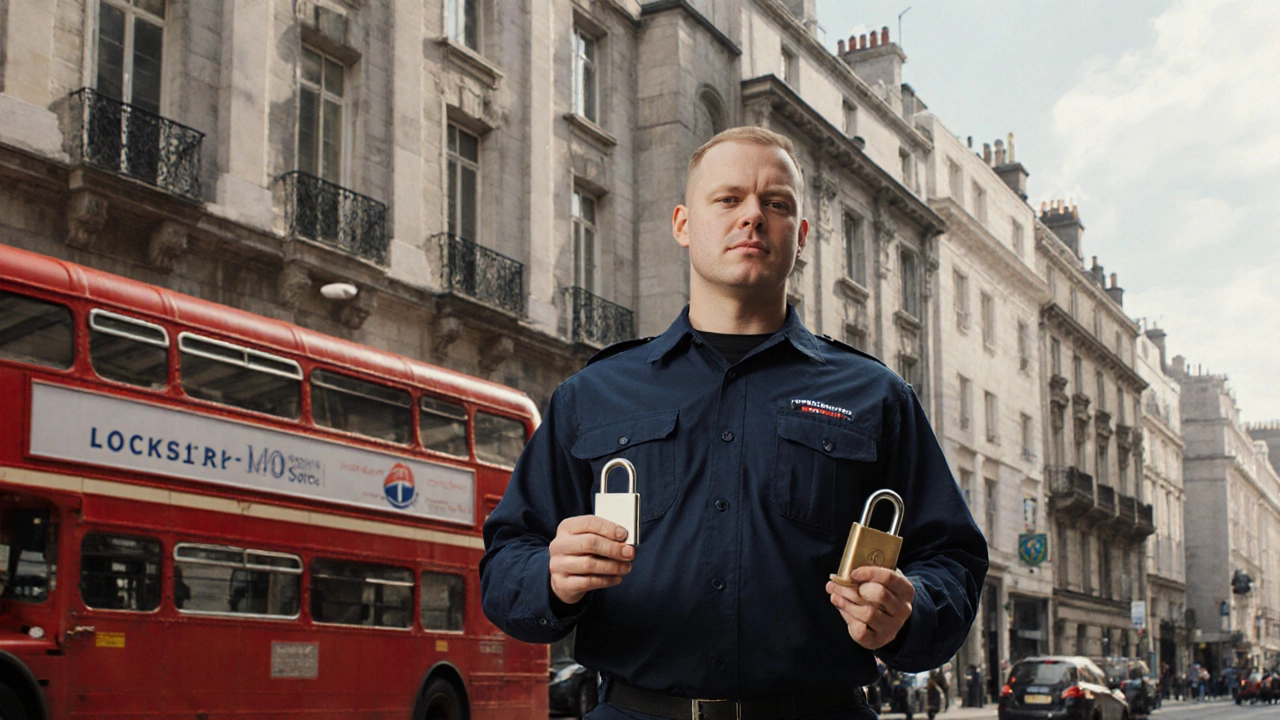
UK Locksmith Salary Calculator
Salary Calculator
Results
Enter your details to see your estimated earnings.
Quick Takeaways
- Full‑time salaried locksmiths in the UK earn between £22,000 and £35,000 a year on average.
- Self‑employed locksmiths typically charge £30‑£55 per hour, pushing annual earnings above £45,000 when work is steady.
- London and the South East pay the most; northern regions lag 12‑18% behind.
- Apprentices start around £12,000-£15,000, but certification can add £5,000‑£10,000 to earnings.
- Specialising in automotive, high‑security, or emergency call‑out services boosts income the most.
If you’ve ever wondered whether a locksmith career can pay the bills, you’re in the right place. This guide breaks down exactly how much locksmiths make across the UK in 2025, digs into the factors that push salaries up or down, and shows you concrete steps to maximise your earnings.
Locksmith earnings in the UK are the total compensation locksmiths receive from wages, hourly rates, overtime, and bonuses, measured annually or hourly, and vary by region, employment type, and level of certification. The numbers aren’t static - they shift with inflation, demand for security services, and the rise of smart‑lock technology.
How the Numbers Are Calculated
Data comes from three reliable sources:
- Office for National Statistics (ONS) publishes average hourly earnings for “security and protective services,” which includes locksmiths.
- The National Careers Service provides salary bands for apprentices and qualified tradespeople.
- Industry surveys from the Institute of Certified Locksmiths (ICL) give insight into self‑employment rates and premium specialisations.
We blend these data points, adjust for regional cost‑of‑living differences, and round to the nearest £1,000 for clarity.
Salary by Employment Type
Locksmiths can work in three main setups, each with a distinct pay structure.
- Full‑time employee: Fixed annual salary plus holiday pay and, occasionally, overtime.
- Self‑employed: Hourly rates set by the locksmith, minus business expenses (vehicle, tools, insurance).
- Apprentice: Minimum wage plus on‑the‑job training; earnings rise as qualifications are earned.
Full‑time Employee
Most locksmiths start as employees for security firms or large retailers. According to the ONS, the median annual salary for a full‑time locksmith is £28,500. Entry‑level roles sit around £22,000, while senior technicians in busy metropolitan areas can reach £35,000-£38,000.
Self‑employed Locksmith
Independents charge per call or per hour. In 2025 the typical hourly rate sits at £38, but market leaders earn £55‑£70 for emergency or high‑security jobs. Assuming a 40‑hour work week and 48 weeks of work (accounting for holidays), a mid‑range self‑employed locksmith makes roughly £74,000 before expenses. After deducting vehicle, tools, insurance, and marketing (about 30% of revenue), net earnings land near £52,000.
Apprentice Locksmith
Apprenticeships blend classroom learning with paid on‑the‑job experience. The National Careers Service lists a starting wage of £12,000-£15,000 per year, increasing to £20,000‑£22,000 once the Level 2 certification is achieved (usually after 12‑18 months).

Regional Salary Differences
Location matters. London’s premium cost of living pushes rates up, while the North East still lags. Below is a snapshot of average annual earnings for full‑time locksmiths in 2025:
| Region | Average Salary (£) | Hourly Rate (£) |
|---|---|---|
| London | £38,200 | £22.5 |
| South East | £33,900 | £20.0 |
| Midlands | £27,500 | £16.7 |
| North West | £25,200 | £15.3 |
| North East | £24,000 | £14.5 |
These figures illustrate the 12‑18% gap between the highest‑paying London market and the lowest‑paying northern regions.
Key Factors That Influence Earnings
Beyond geography and employment type, several levers can raise a locksmith’s paycheck.
- Certification level: Holding a Level 3 (NVQ) or a recognised ICL certification adds £3,000‑£6,000 to annual salary.
- Specialisation: Automotive, safe‑cracking, and electronic lock systems command higher rates.
- Response time: 24‑hour emergency call‑out fees can double the normal hourly rate.
- Business acumen: Effective marketing, repeat‑customer contracts, and fleet management cut costs and boost net profit.
- Tool investment: Modern diagnostic equipment for smart locks reduces job time, allowing more calls per day.
How to Boost Your Locksmith Income
Here’s a practical, step‑by‑step roadmap for moving from a £22k starter salary to the £45k‑£60k bracket.
- Complete a Level2 NVQ while working as an apprentice - this alone can add £2,500‑£4,000.
- Enroll in ICL’s Advanced Security Certification (Level3) - expect a £3,000‑£6,000 salary bump.
- Invest in a smart‑lock diagnostic kit (£1,200) and learn the latest firmware updates - this can shave 10‑15 minutes off each job, translating to extra billable hours.
- Offer a 24/7 emergency service contract for local businesses. Charge a £45‑£55 per hour premium, plus a £150 call‑out fee.
- Build a simple website with SEO keywords like “locksmith salary UK” and “emergency locksmith London”. A modest online presence can lift your job volume by 20‑30%.
- Consider forming a limited company once your annual turnover exceeds £30k. Tax efficiencies can increase net take‑home by up to £5,000.
Following these steps typically moves a locksmith into the upper‑mid‑range salary bracket within 2‑3years.

Sample Salary Calculator
Use the quick calculator below to estimate your potential earnings based on hours worked, hourly rate, and region.
- Choose your region’s base hourly rate (see table above).
- Add any premium for specialisation (+£5-£12 per hour).
- Multiply by expected weekly hours (e.g., 35‑45).
- Multiply by 48 weeks to account for holidays.
Example: A self‑employed locksmith in the Midlands charging £38 base + £8 specialisation works 40 hours a week.
Annual gross = (38+8) × 40 × 48 = £88,320.
After 30% business costs, net ≈ £61,800.
Future Outlook: What 2026 May Hold
Smart‑lock adoption is projected to grow 14% annually, creating demand for technicians who can program Bluetooth, NFC, and cloud‑linked access systems. The ICL predicts that specialists in digital lock technology could earn an extra £7,000‑£12,000 per year by 2026.
However, competition could rise as more trade schools add locksmith modules. Staying ahead with continuous CPD (Continuing Professional Development) will be crucial.
Frequently Asked Questions
What is the average hourly rate for a locksmith in the UK?
The median hourly rate in 2025 is around £38, but rates can range from £30 in rural areas to £55‑£70 for emergency or high‑security work in London.
Do locksmith apprentices earn the national minimum wage?
Apprentices are paid at least the national minimum wage for their age, typically translating to £12,000‑£15,000 a year in the first year.
How much does a certified locksmith make compared to an unqualified one?
Certification (Level3 NVQ or ICL Advanced) adds roughly £3,000‑£6,000 to annual earnings because employers and clients value proven competence.
Is self‑employment more profitable than working for a company?
Gross earnings are higher for self‑employed locksmiths, but after expenses net profit usually lands 10‑15% above a salaried counterpart. The trade‑off is irregular cash flow and added admin work.
What regions offer the best salary growth potential?
London and the South East lead in raw pay, but the Midlands and North West show the strongest growth rates (8‑12% year‑on‑year) as local businesses upgrade security systems.
Armed with these numbers, you can decide whether to stay employed, go freelance, or invest in further training to boost your locksmith income.




